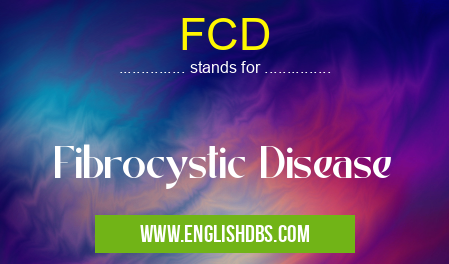What does FCD mean in PHYSIOLOGY
Fibrocystic Disease (FCD) is a condition that affects the breast tissue. It impacts women of all ages, and is characterized by a lumpy, uneven texture in the breasts. It often causes discomfort, but it is not an indication of cancer and is considered to be largely benign.

FCD meaning in Physiology in Medical
FCD mostly used in an acronym Physiology in Category Medical that means Fibrocystic Disease
Shorthand: FCD,
Full Form: Fibrocystic Disease
For more information of "Fibrocystic Disease", see the section below.
» Medical » Physiology
Essential Questions and Answers on Fibrocystic Disease in "MEDICAL»PHYSIOLOGY"
What are the symptoms of FCD?
Common symptoms associated with FCD include breast tenderness or pain, swollen or enlarged breasts, lumpy and/or textured changes in the breast tissue, cyst formation, breast discharge and nipple discharge.
How is FCD diagnosed?
A doctor can diagnose FCD by performing a physical exam and performing diagnostic imaging such as an ultrasound or MRI. Your doctor may also take a sample of any suspicious areas for further testing.
What treatment options are available for FCD?
Generally speaking, treatment for FCD focuses on managing the symptoms; this may include over-the-counter medications such as ibuprofen or acetaminophen to reduce pain and inflammation. If these are ineffective, your doctor may prescribe stronger medications. Additionally, your doctor may recommend lifestyle changes such as reducing caffeine intake or taking warm baths to relieve discomfort. Surgery may be an option for severe cases of FCD.
Is there anything I can do to prevent or reduce my risk of getting FCD?
While there are no sure-fire ways to prevent FCD, you can take steps to reduce your risk by maintaining a healthy weight; limiting your alcohol intake; exercising regularly; getting adequate rest; avoiding caffeine; and wearing supportive bras that minimize exposure to chest irritants such as sweat and lotions with fragrances or dyes.
Is FCD linked to other conditions?
Yes. Some research suggests that women with diagnosable fibrocystic disease are at an increased risk of developing certain types of cancer in their breasts (such as ductal carcinoma in situ). However, it's important to note that the vast majority of cases will not progress to this point — hence why it's generally considered a benign condition rather than one requiring active medical intervention beyond symptom management.
Final Words:
Fibrocystic Disease can cause significant discomfort for many women and should never be overlooked even though it is largely benign. It is important for those experiencing its symptoms to seek medical advice so that diagnosis can take place quickly and appropriate treatments pursued if needed. With self-care practices such as limiting exposure to certain irritants and making necessary lifestyle modifications combined with medical interventions where indicated, most cases can be managed effectively without long-term complications.
FCD also stands for: |
|
| All stands for FCD |
